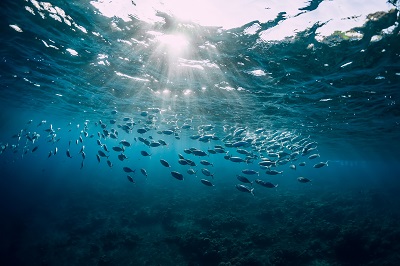 Researchers have developed new mathematical methods to improve biodiversity protection under different fishing and conservation policy scenarios.
Researchers have developed new mathematical methods to improve biodiversity protection under different fishing and conservation policy scenarios.
Applied mathematician Dr Matthew Holden, from The University of Queensland’s School of Mathematics and Physics, said the team’s analysis will help inform a long-running debate in fisheries circles concerning the conservation benefits of marine protected areas (MPAs).
“Fisheries managers often argue that MPAs aren’t as effective at their intended goal of protecting biodiversity as conservationists think, as fish – unlike trees, for example – can easily shift out of the MPA and simply be caught elsewhere,” Dr Holden said.
“And the fact that fish are generally invisible to us and move around makes it mathematically complicated to determine whether we should be ‘sparing’ our fish in MPAs or ‘sharing’ the whole ocean and using other regulatory methods to protect the fish.
“These regulatory methods could include the restriction of gear – for example, rules about what type of nets, baits, fishing lines, and other devices can be used – or counting each fisher's catch and punishing them if it’s over a certain limit.
“This sparing/sharing debate has largely been settled for terrestrial agriculture, showing that, in nearly every circumstance, wildlife friendly farming isn't beneficial for biodiversity when accounting for lost natural habitats required to set up these friendlier but less efficient farms.
“In our oceans, it’s a little more complex.”
The team – led by PhD candidate Philip Erm, co-supervised by Professor Andrew Balmford at Cambridge University – ran a variety of mathematical calculations with global data sets.
They found that combining MPAs with fishing outside of them under fishing regulations is best for biodiversity, but only when avoiding local extinction of sensitive species is a priority.
“Very few scientists dispute that MPAs help species in places where fishing’s totally out of control, but whether they also do so around heavily regulated fisheries is a whole other story,” Mr Erm said.
“Our findings show that MPAs can in fact increase biodiversity in these places if there are also highly sensitive species there.
“For a long time a lot of people thought that MPAs might be worse than useless if they just move fishing and its impacts somewhere else, for no real gain in the big picture.
“Our work shows that their local benefits to biodiversity can still more than make up for any losses caused by moving fishing elsewhere.
“MPAs and fishing regulation have often been held up as rival strategies, but we show that both have a role to play depending on local species and local issues.”
Analysis now needs to be performed to incorporate phenomena not explored in these calculations, including trophic interactions and the costs of implementing each management approach.
The research is published in Biological Conservation.
Media: Dr Matthew Holden, m.holden1@uq.edu.au, +61 406 557 706; Faculty of Science Media, science.media@uq.edu.au, +61 438 162 687.



